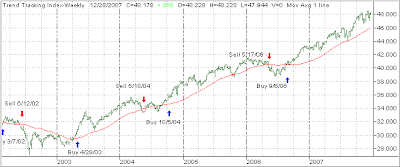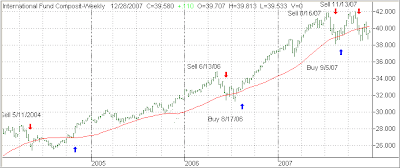 Reader Nitin submitted an article from the NYT written by Floyd Norris titled “Credit Crisis? Just Wait for a Replay.” It tries to look beyond the Subprime debacle by trying to answer the question “What if it’s not just Subprime?”
Reader Nitin submitted an article from the NYT written by Floyd Norris titled “Credit Crisis? Just Wait for a Replay.” It tries to look beyond the Subprime debacle by trying to answer the question “What if it’s not just Subprime?”
It’s an interesting read and makes you look at other potential problem areas. This is not meant to dwell on negatives but to simply be realistic as to what else might be in store. To me, this view is more important for those who simply buy and hold their investments, and disregard any change in trends; because they will be exposed to an indefinable risk should the markets drift toward bear territory.
“As 2007 ends, it seems that the financial world shakes every time a company reveals some new exposure to the disastrous world of subprime mortgage lending.
But just how different was subprime lending from other lending in the days of easy money that prevailed until this summer? The smug confidence that nothing could go wrong, and that credit quality did not matter, could be seen in the many other markets as well.
That was particularly true in the corporate loan market. Loans were cheap, and anyone worried about losses could buy insurance for almost nothing. It was not an environment that encouraged careful lending.
“The severity of the subprime debacle may be only a prologue to the main act, a tragedy on the grand stage in the corporate credit markets,” Ted Seides, the director of investments at Protégé Partners, a hedge fund of funds, wrote in Economics & Portfolio Strategy.
“Over the past decade, the exponential growth of credit derivatives has created unprecedented amounts of financial leverage on corporate credit,” he added. “Similar to the growth of subprime mortgages, the rapid rise of credit products required ideal economic conditions and disconnected the assessors of risk from those bearing it.”
There are differences, of course, and they may be critical in averting a crisis. To start, there are virtually no defaults in corporate lending now, and even if Moody’s is accurate in its forecast that defaults will quadruple in 2008, the default rate on speculative loans and bonds would still be below the long-term average. That hardly sounds like a crisis.
And there is no reason to think that fraud was a big factor in the corporate loan market, as it seems to have been in subprime.
But the history of junk bonds provides a warning that defaults start to rise a few years after credit gets very easy. By that standard, says Martin Fridson of the research firm FridsonVision, a new wave of defaults is overdue. Already, even without defaults, he says, about a tenth of high-yield bonds are trading at distress levels — levels that provide yields of at least 10 percentage points more than Treasuries.
If a recession does occur, one can easily foresee a wave of defaults in junk bonds and their bank-loan cousins, leveraged loans. With highly leveraged structures supported by some of those loans, the surprises could be greater. It is sobering to realize that the issuing of leveraged loans set a record in 2007, even though the market contracted sharply late in the year.
If this was the year that many readers — not to mention financial reporters — learned what C.D.O., M.B.S. and SIV stood for, 2008 could be the year of C.D.S. and C.L.O. (For those who came in late, those abbreviations from 2007 are shorthand for collateralized debt obligations, mortgage-backed securities and structured investment vehicles. The new ones are credit default swaps and collateralized loan obligations — a special kind of C.D.O. backed by corporate loans.)
We have learned in the last month that credit insurers took big risks in backing C.D.O.’s and other exotic things. Some are scrambling to raise more capital to stay in business. One, ACA, may well go out of business.
But if the credit insurers turn out to have had inadequate reserves, what are we to make of the credit default swap market? Mr. Seides calls it “an insurance market with no loss reserves,” and points out that $45 trillion in such swaps are now outstanding. That is, he notes, almost five times the United States national debt.
Many of those swaps cancel each other out — or will if everyone meets their obligations. The big banks say they run balanced books, in which they sell insurance to one customer and buy insurance on the same borrower from another customer. But if some customers cannot pay what they owe, this could be another shock for bank investors. As it is, financial stocks have underperformed other stocks by record amounts this year.
One of the more remarkable facts about the subprime crisis is that total losses to the financial system may be about equal to the amount of subprime loans that were issued. On the face of it, that appears absurd, since many such loans will be paid off, and those that default will not be total losses. But, Mr. Seides said in an interview, “the financial leverage placed on the underlying assets was so high” that the losses multiplied, as the profits did when times were good.
“When there is more leverage” and things go wrong, he said, “there are more losses.”
The corporate credit market is vastly larger than the subprime market, and there are plenty of dubious loans outstanding that probably could not be refinanced in the current market. If some of those companies run into problems, defaults could soar and fears about C.L.O. valuations and C.D.S. defaults could spread long before there are large actual losses on loans.
There are other areas of potential weakness in 2008. Commercial real estate is one area where some see disaster looming. Others worry that some emerging markets could run into big problems because many borrowers there have taken out loans denominated in foreign currency and could be devastated if local currencies lose value.
It was the greatest credit party in history, made possible by a new financial architecture that moved much of the activities out of regulated institutions and into financial instruments that emphasized leverage over safety. The next year may be the one when we learn whether the subprime crisis was a relatively isolated problem in that system, or just the first indication of a systemic crisis.”







